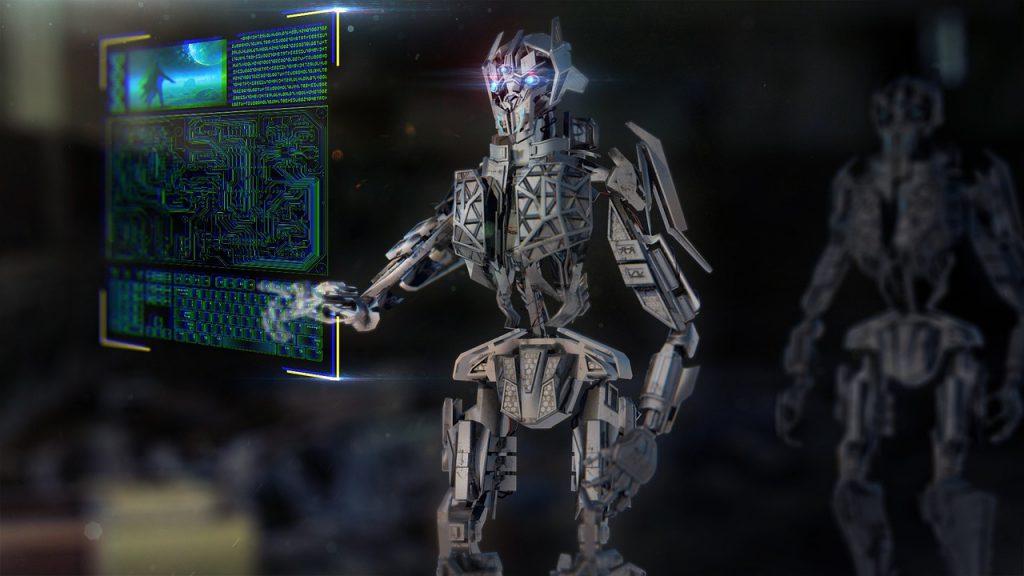
AI Advancements: Shaping a Brave New World
Oct 18, 2023
The breathtaking pace of AI advancements has ushered in an era of unprecedented transformation in the world of technology. In the last six months alone, the landscape has evolved dramatically, propelling us into a future that was once the realm of science fiction. The latest data reveals that 52% of companies have expedited their AI adoption plans in response to the Covid-19 pandemic, highlighting the growing recognition of its immense potential. Remarkably, a staggering 86% of organizations now consider AI a mainstream technology, signifying its pervasive influence across industries.
The ripple effects of these AI breakthroughs extend far beyond the business realm, permeating every facet of our lives. As we continue to witness the rapid evolution of AI, it becomes evident that the job market stands on the precipice of a radical transformation. AI models, such as the revolutionary ChatGpt, are poised to redefine traditional employment paradigms, posing a significant threat to certain high-income professions. Fields such as poetry, digital web design, mathematics, tax preparation, blockchain engineering, transcribing services, translation, and writing face the imminent risk of job elimination or substantial downsizing.
While the prospect of job displacement may evoke concerns, it also presents a remarkable opportunity for the rise of new professions and the reshaping of existing roles. As AI assumes more routine and repetitive tasks, human ingenuity can be channeled toward creative endeavors, complex problem-solving, and innovation. The future workforce will increasingly require adaptability and new skills to thrive in this AI-driven landscape.
As the AI revolution unfolds, it is crucial to strike a balance between embracing the immense possibilities it offers and addressing the potential challenges it poses. Governments, businesses, and individuals must collaborate to navigate this transformative era, ensuring the equitable distribution of opportunities and cultivating a society that harnesses the full potential of AI advancements.
In conclusion, AI advancements are propelling us into a brave new world where the boundaries of what was once conceivable are continually being pushed. The impact of AI on the job market is undeniable, necessitating a proactive approach to reskilling and embracing the untapped potential that lies ahead. By embracing the transformative power of AI while fostering a human-centric approach, we can shape a future where technology and human ingenuity coexist in harmony, ushering in an era of unparalleled progress and innovation.
The Unstoppable Wave: AI’s Impact on the Job Market
The transformative potential of AI on the job market is becoming increasingly apparent, particularly in fields such as medicine and law. The emergence of AI technologies has empowered doctors to swiftly analyze vast amounts of medical data, enabling faster and more accurate diagnoses. AI can turn good doctors into exceptional doctors by reviewing countless cases and studies in minutes. Similarly, AI’s ability to streamline processes and enhance efficiency in the legal and engineering sectors may render some average practitioners obsolete.
Individuals who have embraced AI-powered language models like ChatGpt have witnessed firsthand the significant improvements in efficiency and speed that these technologies offer. The relentless progress of AI is reshaping the job market at an astonishing pace, and the employment landscape of tomorrow is poised to look vastly different from today.
Adapting to this rapidly evolving trend is crucial for individuals seeking to thrive in the future job market. Proficiency in utilizing AI models has become a key determinant of success. Currently, ChatGpt stands as the undisputed leader in the field, revolutionizing various industries with its advanced capabilities. Nevertheless, the landscape is dynamic, and the longevity of any particular AI model’s dominance remains uncertain.
While the prospect of AI-driven changes may evoke concerns about job displacement, it is essential to approach this transformation with a proactive mindset. AI advancements have the potential to augment human capabilities and free individuals from mundane and repetitive tasks, allowing them to focus on higher-order skills that require critical thinking, creativity, and empathy. Embracing continuous learning and upskilling will be vital to remaining relevant in a job market where the integration of AI is the new norm.
As we navigate this era of AI disruption, it is crucial to strike a balance between harnessing the benefits of AI and ensuring a human-centric approach. Governments, educational institutions, and businesses must collaborate to create frameworks supporting reskilling and facilitating a smooth transition for workers affected by AI-driven changes. By doing so, we can cultivate an inclusive and resilient workforce equipped to thrive in an AI-powered world.
How can individuals adapt to the fast-changing AI trends?
To keep up with the fast-paced trend of AI, individuals can take several steps to enhance their skills and remain relevant in the evolving job market:
1. Continuous Learning: Embrace a mindset of lifelong learning. Stay updated on the latest developments in AI by following industry news, attending webinars, conferences, and workshops, and enrolling in online courses or certifications related to AI and its applications.
2. AI Skill Development: Acquire skills that are in demand in the AI field. This may include learning programming languages like Python, data analysis and machine learning techniques, familiarity with AI frameworks and tools, and understanding AI ethics and responsible AI practices.
3. Specialization in Niche Areas: Consider specializing in areas where AI is making significant advancements, such as natural language processing, computer vision, or robotics. Developing expertise in these niche areas can provide a competitive edge and open up new opportunities.
4. Collaboration and Networking: Engage with AI communities, participate in forums, and collaborate with peers and experts in the field. Networking can help you stay updated on the latest trends, exchange knowledge, and find mentorship or job opportunities.
5. Problem-Solving and Critical Thinking: Sharpen your problem-solving and critical thinking skills, as these are essential for working with AI technologies. AI is not just about technical skills but also the ability to analyze complex problems, identify opportunities, and design innovative solutions.
6. Embrace Interdisciplinary Skills: AI is a multidisciplinary field. Consider developing skills in areas like statistics, data analysis, domain expertise (e.g., healthcare, finance, marketing), and human-centered design. The ability to bridge the gap between technical and non-technical domains can be highly valuable in AI-related roles.
7. Emphasize Creativity and Soft Skills: While AI can automate routine tasks, creativity, emotional intelligence, and soft skills like communication, teamwork, and adaptability are still highly valuable. Cultivate these skills to complement AI technologies and excel in roles that require human ingenuity and interaction.
8. Ethical and Responsible AI Practices: Stay informed about ethical considerations and responsible AI practices. Understand the implications of AI on privacy, bias, fairness, and transparency. Being well-versed in these areas will be increasingly important as AI technologies continue to shape society.
Remember, AI is a rapidly evolving field, and the ability to adapt and learn new skills will be essential. By embracing continuous learning, staying up-to-date with industry trends, and developing a diverse skill set, individuals can position themselves to thrive in the fast-paced world of AI.
Are there AI frameworks and tools for individuals to explore?
Familiarizing yourself with the following AI frameworks and tools can be beneficial in staying relevant in the field:
1. TensorFlow: TensorFlow is an open-source machine learning framework developed by Google. It provides a comprehensive ecosystem of tools, libraries, and resources for building and deploying machine learning models. TensorFlow is widely used for tasks like image and speech recognition, natural language processing, and predictive analytics.
2. PyTorch: PyTorch is another popular open-source deep learning framework. Developed by Facebook’s AI Research lab, PyTorch offers a dynamic computational graph and a user-friendly interface, making it favored by researchers and developers. It is widely used for computer vision, natural language processing, and reinforcement learning tasks.
3. Keras: Keras is a high-level neural network API written in Python. It provides a user-friendly and intuitive interface to build and train deep learning models. Keras is often used with TensorFlow as a higher-level abstraction for creating complex neural networks.
4. Scikit-learn: Scikit-learn is a versatile open-source machine-learning library in Python. It provides a wide range of tools and algorithms for classification, regression, clustering, and dimensionality reduction tasks. Scikit-learn is known for its ease of use and integration with other scientific Python libraries.
5. Apache Spark: Apache Spark is a powerful distributed computing framework with machine learning libraries. It enables large-scale data processing and machine learning tasks, making it suitable for handling big data and performing distributed training of models.
6. Microsoft Cognitive Toolkit (CNTK): CNTK is a deep learning framework developed by Microsoft. It offers efficient training and inference for deep neural networks, supporting various programming languages. CNTK is well-regarded for its scalability and performance.
7. OpenAI Gym: OpenAI Gym is a toolkit for developing and comparing reinforcement learning algorithms. It provides a wide range of pre-built environments and evaluation metrics, making it easier to experiment and benchmark reinforcement learning agents.
8. H2O.ai: H2O.ai is an open-source machine learning platform offering various libraries and tools for data analysis and model building. It provides an interface for building machine-learning models and automated machine-learning capabilities.
Remember that the AI landscape is dynamic, and new frameworks and tools may emerge over time. Staying adaptable and open to learning new technologies will be crucial in navigating the ever-evolving AI field.
Google vs. Microsoft: Who Will Win the AI Race?
The AI race between companies like Google and Microsoft is heating up, with both firms releasing a wave of useful AI products. However, Google has been slow to respond, and its cash cow – search – still earns around 60% of its revenue. If it’s affected, it will knock on Google’s ability to fund other projects, and many of these projects have already been cut or eliminated.
Another factor to consider is the “stickiness” of products. People are often reluctant to switch to something new once they’ve become comfortable with a particular product. Getting them to embrace something new is hard enough; once they do, they stick with it unless it starts to malfunction. The masses are lazy, making Google’s job much harder.
However, it’s not over for Google. The company has deep pockets, and we don’t know how advanced it is in AI and language models. Bard is a slimmed-down version of Lambda, so there’s still a chance it could pull a Houdini. Still, the question of who wins the AI race is not the real issue. What’s more important is that the AI trend has just accelerated. With these two giants battling it out and other companies on the fringe, the race is speeding up rapidly.
Ultimately, the AI race is not solely determined by the competition between Google and Microsoft. Many other companies, established players, and emerging startups are actively involved in AI research and development. The competition is driving the rapid advancement of AI technologies, benefitting the overall industry.
In this fast-paced landscape, the focus should not solely be on which company will win the race but rather on the broader impact of AI on society, the economy, and various industries. Collaboration, responsible AI practices, and addressing ethical considerations will be crucial for maximizing the benefits of AI while mitigating potential risks.
As the AI trend accelerates, it will likely lead to further breakthroughs, advancements, and new applications. The competition between Google, Microsoft, and other players will contribute to this progress, shaping the future of AI in ways that are difficult to predict with certainty.
Notable AI Breakthroughs
The breakthrough in protein folding prediction using AI is a significant development. In November 2020, the AI system called AlphaFold, developed by DeepMind, demonstrated remarkable accuracy in predicting the 3D structure of proteins, a longstanding challenge in biology. This breakthrough can potentially revolutionize drug discovery, understand diseases, and advance our knowledge of the biological world.
As AI reshapes the job market, individuals must enhance their skills to remain competitive proactively. The fast-paced nature of AI advancements necessitates a commitment to continuous learning, staying updated on the latest technologies, and developing expertise in relevant areas. By embracing AI as a tool and acquiring the necessary skills, individuals can harness its potential and adapt to the changing job landscape.
The AI race between companies like Google and Microsoft, among others, is indeed intensifying. These tech giants are competing to develop advanced AI technologies, improve their products and services, and gain dominance in various sectors. The outcome of this race remains uncertain, as the field is rapidly evolving, and new players may also emerge.
While AI has the potential to enhance human capabilities and productivity, it’s vital to approach its development and implementation with careful consideration of ethical and societal implications. Ensuring responsible AI practices, addressing biases, and promoting transparency are crucial for maximizing the benefits and minimizing potential risks.
As we navigate the future of AI, it’s essential to strike a balance between embracing its transformative potential and ensuring that human values, creativity, and empathy remain at the core. By harnessing the power of AI while staying adaptable and ethically conscious, we can leverage its advantages to drive progress and create a future where humans and AI work together harmoniously.
AI Advances: Transforming Medicine, Tech, Accounting, and Engineering
Here are some recent examples of AI advances in various fields:
AI advances in Medicine:
– AI-assisted diagnosis: AI algorithms have shown promise in detecting and diagnosing various medical conditions, such as skin cancer, breast cancer, and diabetic retinopathy.
– Drug discovery: AI is used to analyze large datasets and accelerate the identification of potential drug candidates, reducing time and cost.
– Medical imaging analysis: AI algorithms can analyze medical images, such as X-rays, MRIs, and CT scans, to aid in the detection and characterization of diseases.
Technology:
– Natural language processing: AI-powered virtual assistants, like Siri and Alexa, use natural language processing techniques to understand and respond to user queries.
– Autonomous vehicles: Advanced AI algorithms are being developed to enable self-driving cars and improve transportation safety and efficiency.
– Facial recognition: AI-based facial recognition technology is used in various applications, including biometric identification, surveillance systems, and access control.
Accounting:
– Automated data entry: AI-powered tools can extract relevant information from invoices, receipts, and financial documents, reducing manual data entry tasks.
– Fraud detection: AI algorithms can analyze large volumes of financial data to identify patterns and anomalies indicative of fraudulent activities.
– Financial forecasting: AI models can analyze historical financial data to provide accurate forecasts and predictions for budgeting and financial planning.
Engineering:
– Structural design optimization: AI algorithms can optimize the design of structures, such as bridges or buildings, considering various factors like cost, stability, and safety.
– Predictive maintenance: AI-based predictive maintenance systems analyze sensor data from machinery to identify patterns and predict equipment failures, enabling proactive maintenance and reducing downtime.
– Energy efficiency: AI is used to optimize energy consumption in buildings and industrial processes by analyzing data and making intelligent system adjustments.
These examples showcase how AI impacts different industries, revolutionizes processes, and enables new possibilities. It’s important to note that AI advancements are rapidly evolving, and breakthroughs are constantly being made, driving innovation and shaping the future of these fields.










